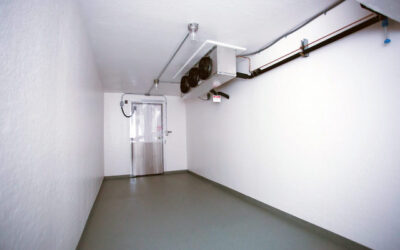In the early 2000s, the pharmaceutical industry was dominated by chemically synthesized small-molecule drugs that were largely shelf-stable. Because they could handle a wide range of temperatures without degrading and losing efficacy, manufacturers could store them in standard warehouse conditions, often at room temperature without refrigeration.
Then modern tools, such as CRISPR, recombinant DNA, and monoclonal antibody production platforms came into the picture. Regulatory approval became more streamlined, and the pharmaceutical landscape started to shift. Today, over 40% of all new drug approvals and more than 70% of molecules in active development are biologics — medicines made using living cells with complex structures that are easily destroyed by heat, cold, or agitation.
Why precision matters
Most biologics need to be stored with a narrow temperature range, typically 2°C to 8°C, to avoid degradation. Some products, such as cell and gene therapies or mRNA-based vaccines, require even lower temperatures — ultra-cold or cryogenic storage, typically in the -60 °C to -150°C range. Even short-term exposure to temperatures outside of that range can start to break down the structure, making the pharmaceuticals less effective or possibly even harmful.
Regulatory compliance
With public health and safety at stake, it’s no surprise that strict requirements have been put in place to govern the storage equipment and environments for temperature-sensitive products. These regulations are enforced by organizations such as the U.S. Food and Drug Administration (FDA), the European Medicines Agency (EMA), and standards like USP <1079> and Current Good Manufacturing Practice (cGMP) guidelines.
Requirements include using qualified systems, such as Factory Acceptance Testing (FAT), Site Acceptance Testing (SAT), Installation Qualification (IQ), Operational Qualification (OQ), and Performance Qualification (PQ), detailed temperature mapping, and robust data logging to prevent and detect temperature excursions.
The unfortunate effects of temperature excursions
Temperature excursions outside of the specified range for a product can have far-reaching effects, such as:
- Clinical impact: Sensitive biologics, vaccines, and advanced therapies can degrade when exposed to temperatures outside of the manufacturer’s specified range. These changes may result in loss of potency, reduced efficacy, or undesirable structural changes, all of which can affect patient safety and treatment outcomes.
- Financial loss: When a temperature excursion is recorded, the product’s safety and stability can no longer be assured, which can lead to entire batches being discarded. This can cause costly write-offs, recalls, and possible insurance claims.
- Regulatory and brand risk: Failing to maintain proper storage conditions can lead to FDA Form 483 observations, which can delay product approval, release, or distribution. And because FDA Form 483s are part of the public record, they can also raise red flags for potential partners, investors, and distributors — eroding trust and impacting future business opportunities.
Precise and reliable temperature control

Polar Leasing pharmaceutical cold room rentals are designed to meet the rigorous requirements of the pharmaceutical industry.
The electric-powered 208–220 volt, single-phase units are built for efficiency, using the KE2 Therm control system to improve energy efficiency and maintain strict temperature ranges and tolerances. This advanced refrigeration controller intelligently manages compressor run time and defrost cycles, reducing energy consumption by 15–50% and preserving product integrity.
The redundant systems have 2 compressors with lead lag for superior efficiency and reliability. This allows one to always stay on when the other defrosts and serve as a backup in the event of compressor failure, so the system can continue running.
Polar Leasing rental units also feature a convenient port on the back so companies can install monitoring equipment inside that is compatible with their external systems. If requested, we can also configure our pharmaceutical chambers to track metrics, such as door openings/closings and temperature logs.
Ambient options
Because some temperature-sensitive pharmaceuticals need to be kept between 65°F and 80°F, Polar Leasing also offers a cost-effective ambient temperature pharmaceutical chamber. This NSF-approved unit reduces energy consumption and maintenance costs, making it an economical choice for products that don’t require cold storage.
Additional hurdles
Contract Manufacturing Organizations (CMOs) and compounding pharmacies also face logistics challenges. Between struggling to fit products into what is often limited onsite cold storage and responding to temporary high demand from product research and development, facility renovations, or disaster recovery, they often have more products to store than they have space to store them.
Scalable solutions
Because pharmaceutical companies often have more latitude to lease temporary solutions rather than purchase expensive equipment, renting pharma cold rooms from Polar Leasing for short- or long-term periods is a good solution.
Polar Leasing standalone pharmaceutical chambers come in a variety of sizes, including popular 8’x10’, 8’x20’, and pallet-accessible 8’x20’ models, making it easy to add or remove units to meet storage needs as demand fluctuates. Since Polar Leasing can typically deploy units quickly — within 24 hours in some regions — pharmaceutical companies can adapt to changing needs without disrupting operations.
Sanitary environments
Arguably the most important factor in pharmaceutical applications is the ability to maintain a sanitary environment. The unique design of Polar Leasing pharma cold rooms make them the ideal choice for pharmaceutical applications. They are engineered using a proprietary, single-piece construction method that combines high-performance polyisocyanurate rigid board insulation with a smooth and seamless fiberglass exterior. The durable fiberglass surface is easy to clean, without any cracks or crevices where bacteria can accumulate. This design is particularly important for compounding pharmacies that need to minimize contamination risks to follow best practices and meet cGMP standards.
Pre‑validated and factory‑tested
We test parameters such as temperature performance, sensor calibration, and system operation, pre-validating each unit in the factory before shipping. Our rental pharmaceutical chambers arrive on site with a full GMP documentation set that includes each unit’s test results, calibration certificates, and editable templates for Design Qualification (DQ), Installation Qualification (IQ), and Operational Qualification (OQ). This high level of quality control completes a significant portion of the qualification process and accelerates regulatory compliance.
Polar Leasing—the best choice for rental pharmaceutical cold storage
As the pharmaceutical landscape continues to evolve, you can count on Polar Leasing to provide the excellent service and reliable cold storage rentals your compounding pharmacy, contract manufacturing organization (CMO/CDMO), biotech startup, clinical-stage pharmaceutical company, specialty pharmacy, pharmaceutical distributor, hospital/health system pharmacy, stability testing lab, QA/QC facility, or life sciences logistics provider needs.
Our reliable, hygienic pharma cold rooms provide precise temperature control and tolerances, robust quality control, and GMP-ready documentation to meet or exceed the needs of the pharmaceutical industry.
Ready to safeguard your products with storage you can trust? Contact us today to find out how Polar Leasing can help with your pharmaceutical cold storage needs.



